- Home
- Jane Smiley
Golden Age Page 4
Golden Age Read online
Page 4
According to Russ Pinckard, the government had three billion, or even four billion stored bushels, so a bad corn crop wasn’t going to help anyone, but the farmers sitting around the café taking in the air conditioning, such as it was, agreed that no one knew what was really stockpiled. Jeff Green, who ran the NPPC hog facility between Denby and Usherton, had relied on government figures to decide when to buy feed, and his estimated cost had turned out to be too low by fifty thousand dollars. Jesse said you could gauge the stockpile by the fluctuations at the Board of Trade in Chicago, but in Joe’s private opinion, if the quantities themselves were rising and falling the way the prices did, then thieves or ghosts were hard at work supplying and removing tons and tons of corn every hour of every day. At any rate, Jesse had admitted the night before at supper that prices were falling because traders were hedging their positions. “Are you doing that?” said Lois, and Jesse nodded one of those Mom-don’t-tell-me-what-to-do nods. So, at least for now, Jesse was betting that a smaller crop would lead to lower prices. Walter the patriarch, Joe’s dad, Jesse’s granddad, would have been vindicated. But upset.
Lois asserted that either God would provide or the punishment, whatever it was, would be just. However, she was doing some stockpiling herself—two fifty-pound bags of flour, a case of dried beans, and two cases of evaporated milk had appeared in the cellar just this week. She had joined a group based up in Wisconsin that saved the seeds of old-fashioned varieties of vegetables and fruits, and was carefully labeling and saving her best garden seeds—not only tomatoes, peppers, seed potatoes, and squash, which you could justify in the name of flavor, but onions, beets, turnips, carrots, and parsnips, which all tasted the same to Joe. Stashed-away turnips made him think about wartime. Lois wouldn’t plant a hybrid in her garden; she still gathered butternuts; she still pretended that her apple and pear trees were all about flavor and pies. She tended them not only with care but with prayer.
Jesse had a soil map of the farm on his computer. Every day or so, he went out with his moisture gauge and his temperature gauge and tested the various soil types, and plugged them into the map. He therefore knew that on the field behind his house, where the soil was loamier, the moisture content was 8 percent greater than it was on the east field, where both dogs were now barking, but 2 percent less than on the west field, where Opa had long kept cattle, sheep, and horses, and for decades had turned their manure under. On the hill behind Joe’s house, where everyone had always been careful to terrace if they planted it at all, you could see the soil shading from dark chocolate to caramel just by looking at it; the dust blowing off the brow of the hill was as dry as sand, while on the lower terraces the beans looked like they might survive; but Jesse had mapped it anyway. The map was in and of itself interesting, and Joe liked to look at it and remember what had happened in this or that spot over the last sixty years. Not every event had improved the soil, but every one had deepened his attachment to the farm, like it or not. The savior Jesse prayed to was Frank. He didn’t ask him for money (which reminded Joe that his mother had always said that you were never to “pray for goods, only for goodness”), but he did ask him for advice. Frank’s most recent advice, handed out yesterday, over the phone from wherever Frank and Andy were spending the summer, had been to sell the place, take the money, move to Cedar Falls, and start a commodities-trading office. Jesse laughed, Jen looked shocked, Lois said, “Good Lord, Cedar Falls! Might as well move to Milwaukee and live with Annie!” Joe thought with an inward shudder of being confined to a fenced-in yard with his two dogs and having to greet the neighbors twenty times a day. And whatever the weather was in Iowa, it was worse in Milwaukee.
Jen’s fallback position was that everything would work out because it always had. She was an optimist—the last Guthrie pessimist had been Jen’s great-uncle Oliver, father of Donald, who’d gone to the old schoolhouse with Joe and Frank. Oliver had lived to be ninety-five even so; the Guthries saw this as a proof of the power of positive-thinking genetics. Jen was a lovely girl, and very sweet, but she wouldn’t have a stockpile in the house—she thought it was bad luck and bad faith. The Guthrie motto was “Do what you want to do, and everything will be fine.” Wasn’t her second child nicknamed Perky? And a third one was on the way—Jen had driven to Iowa City at the end of June for an ultrasound, and was unsurprised to discover that little Felicity was healthy and already, at twenty weeks, sucking her thumb.
Joe couldn’t tell if Minnie was worried about the drought (there, he had thought the word). She kept her thoughts to herself, smiled when you looked at her, and didn’t say much. This had always given Joe the feeling that she knew more than she was prepared to divulge. Everyone loved Minnie, including Lois, who was a little afraid of her (but, then, Minnie was a little afraid of Lois). However, should the disaster befall, no matter what it was, anything from a well drying up to the End Times (something Pastor Campbell liked to refer to), you had the feeling that Minnie would sigh and carry on, whether raptured up or left behind, and nothing about either experience would flummox her in the least.
As for Joe himself, he fell back on memories. He knew exactly when the last drought that was this bad had been—1936, the year his uncle Rolf hanged himself in the barn. He’d been fourteen; Rolf would have been a year or two younger than his mother, Rosanna, probably he was not even thirty-five when he did it. Since Joe had turned sixty-six in March, thirty-five now seemed to him awfully young to give up. But he remembered how old Rolf had looked to him then, how desperate, how trapped on Grandpa Otto’s farm. He remembered in particular Grandpa Otto standing in the barn doorway, yelling at Uncle Rolf in German about something, waving his arm toward the dusty fields and the wizened corn crop. What had been Rolf’s fault or mistake? Joe hadn’t known enough German to understand. Rolf’s death had overshadowed the fact that on their own farm his father, Walter, had gotten only twenty-three bushels an acre that year for the corn, and sixteen for the oats (though they were then mostly growing the oats for themselves and the animals—the oats and the straw did get them through that winter, if only just). This year, already on the first of July, the farmers who fed cattle were talking about selling them off—the corn crop could fail entirely. But it never had. In 1953, the year Joe took over the farm after his father died, he got fifty-six bushels an acre and was thrilled; three years ago, he and Jesse were quietly proud of 126 bushels an acre—they’d have settled for 110. Walter would have shaken his head in suspicious disbelief: not going to get ten cents a bushel for that, he’d have said. And Rosanna would’ve said he was spoiled rotten. Joe stretched his left shoulder, pressed the spot that always hurt with his right thumb, and vowed not to throw Rocky’s tennis ball today, even though Rocky brought it to him and dropped it at his feet. Joe kicked it; it rolled away. Rocky glanced at him in disbelief, then ran after it. Snickers was lost in the dusty corn, hunting rats for sport.
Joe picked up the little shovel beside the pen and went in—one mess in the back corner, which he scooped up and tossed out into the weeds (nutrients in dog shit, too). Then he filled the water bowls. Lois had put her foot down about no dogs in the house at night, and no dogs on the new couch, and no dogs alone in the kitchen since last summer, when she happened to come in from the garden and see Snickers, his paws on the edge of the counter and the cooling carrot cake between his jaws. He called the dogs and went inside, pausing to turn the face of the thermometer that was hanging there to the wall. Maybe that was Joe’s fallback—the less you think about it, the better.
—
WHEN RILEY GOT UP to go to the bathroom, she tried to be quiet—if she wanted to get back to sleep, she had to think some blank thought like “blah blah blah” so as to not worry about anything—but she’d made the mistake of looking out the bathroom window, and she saw lightning off to the west. She stood there staring at the brilliant, silent forks that looked like the nervous systems of giants stalking over the peaks. She could hear no thunder, though, since the storm was far away. That was i
t for sleep. She went into the living room of their one-bedroom; outside the front window, which looked over the town, everything was calm—only occasional brightening reflections of the drama to the west. She sat in a chair in her T-shirt, waiting for the apocalypse. She thought it wouldn’t take long—it was already happening in Yellowstone, where hundreds of thousands of acres had burned and the Forest Service was not even close to containing it.
All of this Charlie gathered when he got up, admittedly after nine-thirty, to find Riley sitting over her third cup of coffee. Charlie was a heavy sleeper. His hours at the outfitter’s were cut back because of the failure of the tourist season, and no one was rafting because the rivers were so low, but he and Riley had savings from the previous two years, so he was a little lazy lately. The TV was on, and so was the radio. Riley needed to know about any wildfires off to the west. As soon as Charlie said, “Why would there be—” she threw back her head and rolled her eyes about the Forest Service. Charlie had the expert opinion to back him up. The Forest Service had blown it for years, suppressing every fire, by law, by 10:00 a.m. the day after it started. But they’d changed that policy. Now that the Forest Service allowed naturally set fires to burn themselves out, the undergrowth was being cleaned up instead of being allowed to accumulate around the bases of the lodgepole pines, 250-year-old lodgepole pines at the end of their natural life cycle, acting as tinder for the next lightning strike. It was not certain, but why not hope for the best? It was entirely possible, with controlled burns, that the problems would be eased, here in Colorado and elsewhere, without a second Yellowstone taking place. And the pines could be carefully thinned. Yellowstone was a lesson, deserved, but also well learned—
Riley jumped out of her chair and took her cup to the sink. He just didn’t get it, did he? In the first place, the Yellowstone fire had started when weather conditions caused controlled burns to get out of control, and in the second place, the drought this year was the sign of things to come, that the ecosystem was going through a permanent shift.
Right about then, Charlie actually got himself together. He said, “What happened?”
That’s when she told him about the lightning strikes she’d seen. He adjusted his shorts. He was not angry. He recognized that if you grew up in Stevens Point, Wisconsin, if your grandfather was a locally prominent Native American artist who lived on the Menominee Tribal Lands, where your mother had lived until she was twelve, if you studied the Peshtigo Fire in fourth grade, it was much like growing up in St. Louis and studying the Missouri Compromise. Then she said the word, the hot-button word. It was “Hansen.” The button that the word pushed was not Charlie’s, it was Riley’s own button. James or George Hansen or Hanson was a physicist or a climatologist who measured long-term temperature changes on Earth as well as on Venus; according to him, the last ten years had contained some-number of the hottest years in the last number-of-years. Charlie’s inability to remember the details was a simmering problem between them. He did know that Hansen had gone to the University of Iowa. Since Charlie had been there, and driven around downtown Iowa City on his way back to St. Louis, Iowa was now fixed in his mind. He’d also thought about his new aunt Tina, in Sun Valley—just Saturday, at the shop, he’d asked Bob how far Sun Valley was from the fires, and Bob had said he thought maybe three hundred miles west, which was safer than being three hundred miles east.
He said a wrong thing: “We probably should have stayed in Golden, but—”
Golden was where the Solar Research Institute was, but the funding had dropped again, and Riley’s internship had been canceled in June. Charlie’s rafting trips had been so lucrative that they’d decided that the most eco-sensitive choice was for her to move to Aspen, where he had a job in a locally owned equipment store and was closer to the rafting company, while Riley looked for another position. Riley had enjoyed hiking and camping. However, “Hansen” prodded her, made her certain she was wasting time. Here it was, mid-September; graduate programs were starting up everywhere, and she hadn’t applied.
She said, “We should have. I regret that every single day.”
Charlie hadn’t realized that.
But maybe if Riley had not been sitting up since 3:00 a.m., thinking apocalyptic thoughts, staring at the horizon out of the bathroom window for tendrils of smoke rising into the morning sky, she would not have noticed the look on his face that said, Oh, be reasonable, a blip is a blip, we need more data. (That was not what he was thinking; he was thinking, I can’t handle this until I have a cup of coffee and something to eat, maybe she’ll let me take her out for breakfast in spite of the budget.) The look on her face changed—Charlie could read it—it said, Revelation. Then she said, softly, “I think we’re done, baby.” And she got up and went into the bedroom. He noted the pale curve of her thigh as she left the room, the bounce of her half-red hair on her neck. She was his first girlfriend, and he didn’t want another. She was patient (most of the time), broken in, used to him; he would drive her anywhere; he would try anything she cooked, including tofu, including nettle tea; he loved her breasts and her lips especially. He followed her into the bedroom.
He hadn’t made the bed. She had, of course, and perfectly. Now her big old suitcase was sitting on the smoothed-over counterpane. Charlie said, “I’ll go with you.”
“And do what?”
“What am I doing here?”
“The ski season will begin eventually.”
“Not according to you.”
“Charlie, you are so much fun.”
“I thought you liked that.”
“I’m getting old.” Her face was smooth, unlined; her hair thick. She looked sixteen.
Charlie said, “You’re twenty-two.”
“I’m not learning anything here. If I apply to the Forest Service, they will stick me in a fire lookout somewhere, and I will sit there scanning the horizon, and then I will make friends with a deer and a fox or two, and then I will wake up in ten years and be too old to make a difference, and I will have to reproduce and train the kid to make a difference when I didn’t.”
“It can’t be that much of a cri—”
She spun around. Her hair actually lifted as she did so. She barked, “It is.”
“I lo—”
She reached for his hand and pulled him down beside her on the bed. She said, “Yes, Charlie, you do, and I love you. But what is the point of that? You tell me. We aren’t ever going to have kids. We have a good time together and laugh a lot, but in the larger picture, so what? I don’t believe in true love or made-for-each-other. I believe you learn what you can, and you move on. You have to accomplish something.”
“I want you to accomplish something.”
“Then don’t try to keep me here.” Her eyebrows shifted toward one another, and a little vertical wrinkle appeared. Charlie knew this wrinkle meant she was dead serious.
He said, “Just admit that we’ve had a good time here.”
He kept holding her hand in both of his. She tried to pull hers away, the wrinkle deepened, but then she actually smiled. She said, “We’ve had a good time here.”
“Then let me come along so that we can have a good time somewhere else. Look. You have a vocation. As far as I can tell, I don’t. So I’ll support your vocation until mine kicks in.” He loosed his hands, so that he wasn’t gripping hers anymore, and then she snaked her right arm around his back and laid her head in the spot where she put it when she fell asleep every night—right where the trapezius met the deltoid, right where, she said, his “musk” invaded and overwhelmed her chemoreceptors. She sighed a defeated sigh and said, “Okay.”
Charlie said, “Where are we going?”
She said, “We have a year and about ten applications to figure that out.” Then, “Columbia?”
Charlie grimaced at the thought of New York City.
“Harvard?”
Charlie made himself sit still.
“Princeton?”
Charlie put his hands on either sid
e of his head and mimicked an Edvard Munch sort of expression.
“Woods Hole?”
Charlie shrugged.
“St. Paul?”
Only then did Charlie grin.
Riley said, “You are truly one in a million, Mr. Wickett.”
“I might compromise on Madison.”
She said, “We’ll see what I get into. And which one is farthest from Stevens Point.”
They went back into the kitchen. The radio was playing regular old rock-and-roll, and then Leonard Cohen came on, “First We Take Manhattan.” Without seeming to realize it, Riley started bebop-ping around the kitchen. There was nothing about any fires nearby. At noon, Charlie went out and bought The Denver Post. Not much. When he returned, though, Riley was parked in front of the television, staring at what turned out to be footage of the Old Faithful Inn, in Yellowstone, not of the firestorm itself but of the aftermath—people saying how they had been stuck on the roof ready to die, how they had been watching the fire when, suddenly, they’d had to run for cover, how firebrands had landed all around them, how a fireball had shot down one slope toward the inn but missed it. Everyone was shaken, no one was dead. Charlie stood there until the report was over. She was upset; Charlie was, too. But what a plan gave you, no matter how bad things looked, was a path. And so she only shook her head and said, “Jesus. When is this going to end?” They sat quietly in their little safe spot for the rest of the afternoon, not saying much, and eating leftover macaroni and cheese for dinner.
1989
DEBBIE PULLED OUT Arthur’s chair; he let her, though it made him feel stupid. Then she opened the menu for him. He peered at it, turned it upside down, and perused it seriously until she finally said, “Oh, Dad!” and laughed. Once she laughed, he set the menu down. The only thing he liked was French toast, and maybe a slice of bacon. Her mouth opened, and he said, “I do not know anything more about cyanide in the grapes.”

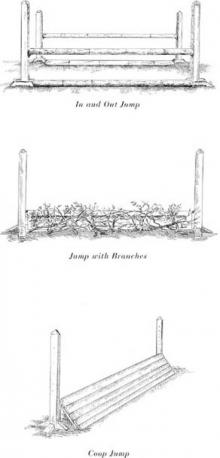 The Georges and the Jewels
The Georges and the Jewels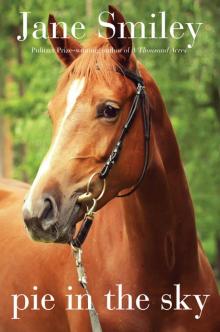 Pie in the Sky: Book Four of the Horses of Oak Valley Ranch
Pie in the Sky: Book Four of the Horses of Oak Valley Ranch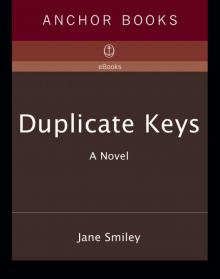 Duplicate Keys
Duplicate Keys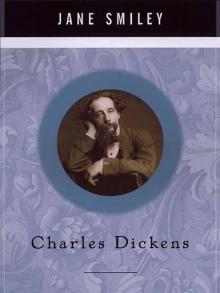 Charles Dickens
Charles Dickens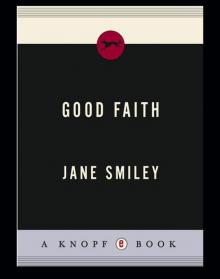 Good Faith
Good Faith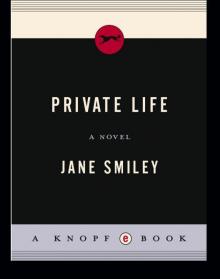 Private Life
Private Life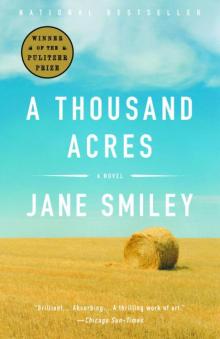 A Thousand Acres: A Novel
A Thousand Acres: A Novel The Greenlanders
The Greenlanders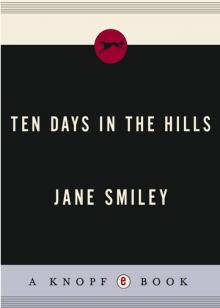 Ten Days in the Hills
Ten Days in the Hills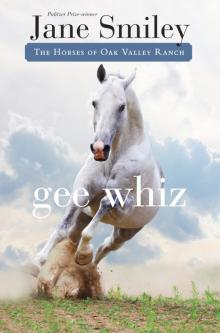 Gee Whiz: Book Five of the Horses of Oak Valley Ranch
Gee Whiz: Book Five of the Horses of Oak Valley Ranch A Thousand Acres
A Thousand Acres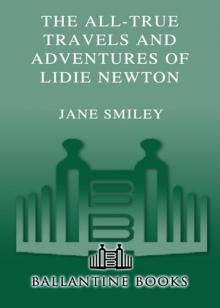 The All-True Travels and Adventures of Lidie Newton
The All-True Travels and Adventures of Lidie Newton Ordinary Love and Good Will
Ordinary Love and Good Will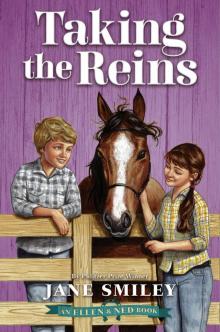 Taking the Reins (An Ellen & Ned Book)
Taking the Reins (An Ellen & Ned Book)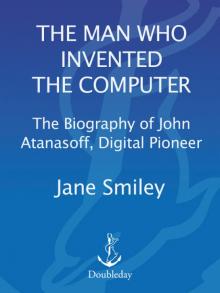 The Man Who Invented the Computer
The Man Who Invented the Computer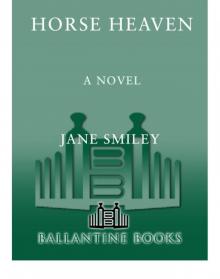 Horse Heaven
Horse Heaven The Age of Grief
The Age of Grief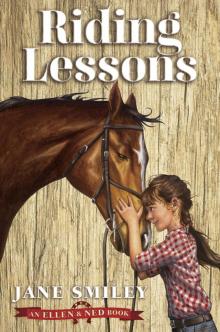 Riding Lessons
Riding Lessons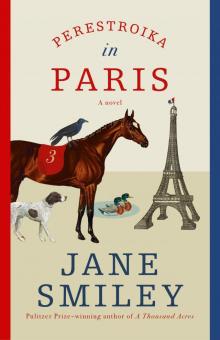 Perestroika in Paris
Perestroika in Paris A Good Horse: Book Two of the Horses of Oak Valley Ranch
A Good Horse: Book Two of the Horses of Oak Valley Ranch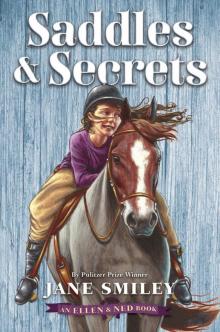 Saddles & Secrets (An Ellen & Ned Book)
Saddles & Secrets (An Ellen & Ned Book)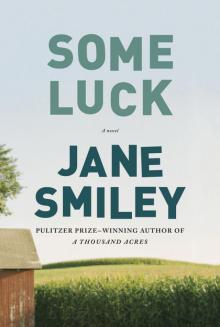 Some Luck: A Novel
Some Luck: A Novel Champion Horse
Champion Horse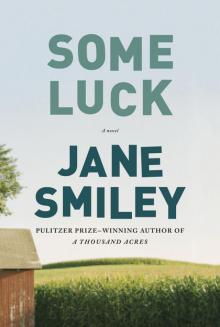 Some Luck
Some Luck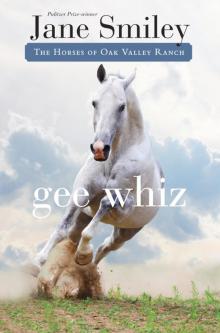 Gee Whiz
Gee Whiz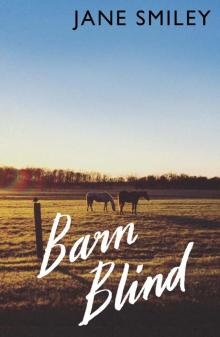 Barn Blind
Barn Blind A Thousand Acres (1992 Pulitzer Prize)
A Thousand Acres (1992 Pulitzer Prize)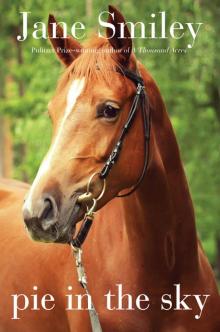 Pie in the Sky
Pie in the Sky True Blue
True Blue A Thousand Acres_A Novel
A Thousand Acres_A Novel A Good Horse
A Good Horse